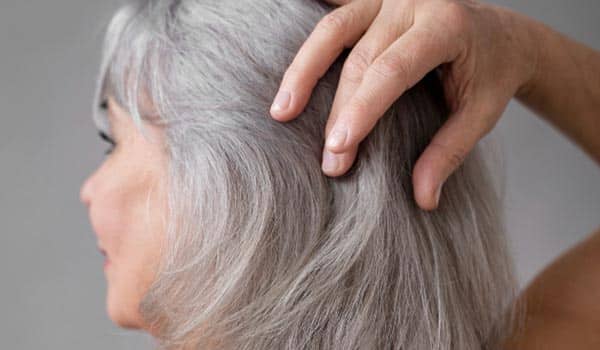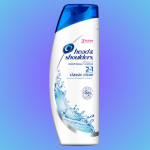Have you ever wondered what magic baking soda can work on gray hair? Are you curious about its potential to transform your locks? Dive into this post to uncover the secrets behind what baking soda can do for your gray strands. From natural remedies to practical tips, get ready to explore how baking soda might be the solution you’ve been searching for.
Discover the surprising benefits and learn how to incorporate this simple ingredient into your hair care routine. Say goodbye to gray hair woes as we unveil the wonders of baking soda!
Quick Summary
Baking soda can remove buildup from gray hair, enhancing its natural shine, but overuse may lead to dryness and brittleness.
Baking Soda Basics
Properties
Baking soda’s alkalinity plays a crucial role in its impact on gray hair. It helps remove impurities by acting as a gentle exfoliant, cleansing the scalp and strands effectively. The pH-balancing qualities of baking soda make it ideal for maintaining healthy gray hair.
Interaction with Hair
When applied, baking soda interacts with the hair shaft by lifting dirt and residue, leaving the hair clean and refreshed. However, excessive use may strip the natural oils from gray hair, leading to dryness. Understanding how baking soda interacts with gray hair is essential to prevent potential damage.
Usage Methods
To use baking soda on gray hair, start by creating a paste with water and applying it gently to damp hair. Massage the mixture into the scalp before rinsing thoroughly. Using baking soda as a mask for gray hair can help clarify and brighten the strands naturally. It is important to note that moderation is key when using baking soda on gray hair to avoid over-drying or damaging the hair.
Gray Hair Insights
Color Changes
Baking soda, when applied to gray hair, can subtly alter its color by removing yellowish tones. It has a lightening effect due to its alkaline nature, making gray strands appear brighter. Monitoring color changes is crucial to avoid over-processing and unwanted results.
Texture Variations
When used on gray hair, baking soda can influence its texture by gently exfoliating the scalp and removing buildup. This can lead to improved hair texture, making it feel smoother and softer. The benefits of baking soda include promoting healthier-looking hair with enhanced manageability.
Aging Hair Care
In caring for aging gray hair, baking soda plays a vital role in addressing specific concerns such as dullness and dryness. Its clarifying properties help remove residue and restore shine to aging strands. Tailored care for aging gray hair involves using products like baking soda that provide gentle yet effective cleansing.
Baking Soda Benefits
Color Enhancement
Baking soda can enhance the color of gray hair by subtly lightening it over time. Its gentle properties help restore vibrancy to dull gray strands, adding a touch of brightness. Using baking soda for color enhancement in gray hair can result in a natural-looking transformation.
Cleansing Effect
As a cleansing agent, baking soda effectively removes buildup and impurities from gray hair, leaving it feeling fresh and rejuvenated. Its clarifying properties help to maintain a clean scalp environment, promoting overall hair health. The cleansing properties of baking soda play a vital role in keeping gray hair looking its best.
Scalp Health
Baking soda’s impact on scalp health is crucial for maintaining vibrant gray hair. By promoting a healthy scalp environment, baking soda helps prevent issues like dandruff and itchiness. A balanced scalp is essential for the vitality of gray hair, making scalp health a key factor in overall hair care.
Potential Risks
Texture Damage
Using baking soda on gray hair can pose risks of texture damage due to its abrasive nature. The alkalinity of baking soda may cause the hair to become dry and brittle, leading to breakage. It is crucial to avoid overusing baking soda to prevent such texture damage.
Color Alteration
Baking soda has the potential to alter the color of gray hair by stripping away natural pigments. This can result in a yellow or brassy tone, affecting the overall appearance. Understanding these risks is essential when considering using baking soda on gray hair.
pH Imbalance
The use of baking soda on gray hair can disrupt the pH balance, leading to an imbalance in the scalp’s natural acidity levels. The alkalinity of baking soda may strip away oils and disrupt the pH, causing dryness and irritation. Maintaining pH balance is crucial for healthy gray hair care.
Safe Usage Guidelines
Proper Mixing
Mix baking soda with water to create a paste for gray hair treatment. Use one part baking soda to three parts water for the right consistency. Thoroughly mix the solution until it forms a smooth paste to avoid clumps.
Application Tips
When applying baking soda on gray hair, ensure even distribution by starting from the roots. Gently massage the mixture throughout the hair for uniform coverage. Avoid harsh rubbing to prevent damage and ensure effective results.
Frequency Advice
For optimal results, limit baking soda treatments for gray hair to once a week. Allow at least a week between each treatment session to prevent overuse and potential damage. Moderation is key to maintaining healthy gray hair.
Natural Alternatives
Vinegar Rinse
Using vinegar rinse after a baking soda treatment on gray hair can bring numerous benefits. It helps restore pH balance, crucial for maintaining healthy and vibrant gray hair. Incorporating vinegar rinse into your routine ensures optimal care for your gray hair.
Herbal Solutions
For those seeking alternatives to baking soda, herbal solutions offer a natural approach to gray hair care. Herbs like rosemary and sage are known for their beneficial effects on gray hair health. These herbal remedies provide nourishment and promote overall well-being for gray hair.
Oil Treatments
In addition to baking soda, oil treatments play a vital role in caring for gray hair. Oils such as coconut oil help retain moisture, preventing dryness and brittleness in gray hair. Including oil treatments in your regimen is essential for nourishing and maintaining the health of your gray hair.
Expert Insights
Professional Advice
Seeking professional advice before using baking soda on gray hair is crucial for optimal results. Hair care experts can provide personalized recommendations based on individual hair needs. Their guidance ensures effective and safe care tailored to specific gray hair concerns.
Consulting a hair care expert offers benefits such as understanding the right proportions of baking soda to use, preventing damage, and maintaining hair health. Their expertise helps in avoiding common mistakes that may arise from improper application or excessive use of baking soda.
Professional guidance plays a vital role in achieving desired outcomes when treating gray hair with baking soda. Experts can recommend complementary products, suggest suitable hair care routines, and address any potential issues that may arise during the process.
Research Findings
Research studies have shown positive effects of baking soda on gray hair, highlighting its ability to remove impurities and enhance shine. Scientific evidence supports the use of baking soda as an effective natural remedy for addressing gray hair concerns.
Studies have revealed that baking soda can help in clarifying the scalp, removing buildup, and restoring natural luster to gray hair. The alkaline properties of baking soda contribute to balancing pH levels, promoting healthier hair growth over time.
Key discoveries in research indicate that incorporating baking soda into a regular hair care routine can improve manageability, reduce yellowing, and enhance overall appearance for individuals with gray hair.
Safety Recommendations
When using baking soda on gray hair, it is essential to follow safety recommendations to avoid potential risks. Precautions should include conducting a patch test prior to full application to check for any adverse reactions.
To minimize risks associated with baking soda, it is advisable to dilute it properly with water before applying to the hair strands. Limiting the frequency of use and rinsing thoroughly after treatment can help prevent dryness or scalp irritation.
Adhering to safety guidelines ensures safe and effective care for gray hair when utilizing baking soda as part of a beauty regimen. Prioritizing caution and moderation in usage can help maintain healthy hair while enjoying the benefits of this natural remedy.
User Experiences
Positive Outcomes
Using baking soda on gray hair has shown remarkable results for many individuals seeking natural remedies. Some users report reduced yellow tones and improved overall hair texture. Incorporating baking soda into their hair care routine has led to brighter, healthier-looking gray hair.
- Enhanced shine and brightness
- Improved manageability and softness
- Reduced yellow or brassy tones
Cautionary Tales
While baking soda can be beneficial, there are cautionary tales of individuals experiencing negative effects due to improper usage. Overuse of baking soda can lead to dryness and damage, causing the hair to become brittle. It’s crucial to follow recommended guidelines to prevent adverse outcomes.
- Dryness and brittleness from overuse
- Potential scalp irritation with excessive application
- Damage to hair cuticles if not used correctly
Personal Recommendations
For those considering using baking soda on gray hair, it’s essential to start with a patch test to check for any adverse reactions. Personal recommendations include mixing baking soda with water for a gentle cleansing paste. Customizing the frequency of use based on individual hair needs is key for achieving the best results.
- Perform a patch test before full application
- Mix baking soda with water for a mild solution
- Adjust usage frequency based on personal preference
Closing Thoughts
Incorporating baking soda into your hair care routine can be a game-changer for managing gray hair. Its natural properties offer a cost-effective solution that could potentially enhance your hair health and appearance. However, it’s crucial to be mindful of the risks and follow safe usage guidelines to avoid any adverse effects. Remember, moderation is key when experimenting with new remedies.
Before you dive into using baking soda for your gray hair, consult with a hair care expert to ensure it aligns with your unique needs. Share your experiences with others to build a community of knowledge and support. Stay informed, stay safe, and embrace the journey to healthier, more vibrant hair!



